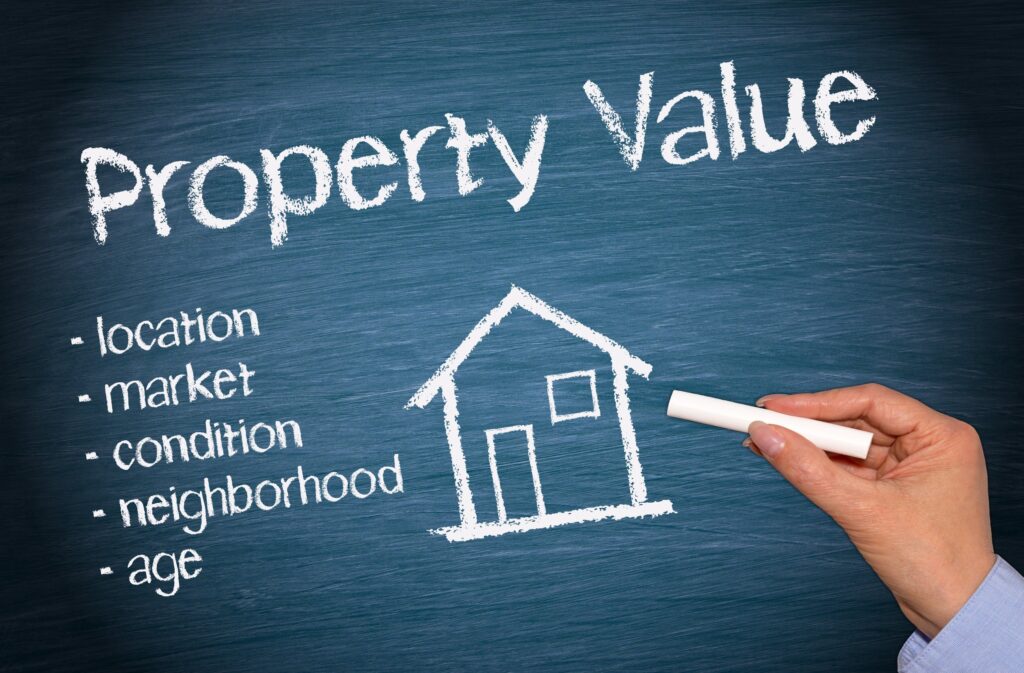
Selling a home can be a draining process. You’ll need to go through mountains of paperwork, get professional photos taken, put up your listing, schedule visits with prospective buyers, draft up contracts, and so much more. However, before you can take any of those steps, you first need to get an accurate property valuation.
Most commonly done by a real estate agent or an RICS property surveyor, it will give you a realistic estimation of how much your property is worth. Although the price your house sells for might be different than the appraisal, it’s a great starting point that helps you get a clear idea of what to expect.
Estate agent valuations can be done both in person and online, but regardless of how you and your estate agent approach them, the process and time commitment are roughly the same.
Take a look below to learn more about how your house valuation might go, how long it takes to complete it, and what you can expect from the process.
How far in advance should I book my estate agent house valuation?
If you’re considering selling your house, it’s generally in your best interest to schedule your offline or online house valuation as soon as possible. There’s no point in delaying it.
If you’re simply curious about the potential value of your home or are interested to know what your inheritance tax threshold would be, an appraisal from your town estate agent could satisfy your curiosity. If you just want to sell, an immediate appraisal can help accelerate the process.
Whatever the case is, the sooner you schedule the appraisal, the sooner you’ll know where you stand.
With this in mind, you should also know that not all estate agents offer immediate valuations. At Property Price Advice, the process is quick, simple, and free, and you can even get an instant online evaluation. However, that’s not the case everywhere. Depending on your chosen realtor and how busy they are in a given period, you might have to schedule your appraisal several weeks in advance.
Another thing you should be aware of is that the real estate market is currently quite hectic, and the true value of your assets might fluctuate daily. That’s why it’s in your best interest to have the appraisal as close to the sale date (or at least the listing date) as possible.
While your appraisal report doesn’t have an expiration date, the market conditions can easily change and affect the value of your property. Ideally, you’ll want to have the appraisal approximately three to six months before the ultimate sale.
How does an estate agent value a house?

Many estate agent guides such as the Red Book by RICS are created to ensure a fair, realistic valuation. However, each realtor will have a different approach to determining your home’s value. A home valuation in the UK can be done using several different methods, including:
- Sales comparison;
- The cost approach;
- Income capitalisation;
- Gross rent multiplier;
- Cash-on-cash return.
The sales comparison approach is the most common one. Your agent will provide you with quotes based on the recently sold values of properties in your area.
For the sales comparison approach to be effective, there needs to be a property in your neighbourhood with similar characteristics to your own home (same size, age, condition, etc.). It needs to have been sold in an open market within the past year and under typical market conditions.
Using the cost approach, the surveyor calculates the value based on the supposed costs of building a comparable property on a comparable lot (taking into account any potential depreciation).
The income capitalisation approach is used for income-generating properties such as apartment buildings or offices. It is a valuation based on the projected rate of return and the future net income the property could produce.
The gross rent multiplier (or gross income multiplier) is a valuation approach that estimates the worth of a property based on how much rent-generated income it could produce. Finally, the cash-on-cash return is based on the difference between the required cash investment and a property’s total net operating income.
You can always double-check with your real estate agent to see which valuation approach they’re using and ask any questions you may have regarding their methodology. Still, regardless of their approach, they should provide you with a fair, accurate assessment.
How long does an estate agent property valuation last?
How long your property valuation will last depends on several factors, including the size of your property, its location, how easy it is to access it, and countless unique features. If you have an average family home with no special features like additional amenities, the valuation could last just about 15 minutes. If you have a unique property with an accessory dwelling unit, for instance, or other uncommon features, the valuation could last well over an hour.
The time commitment can also depend on the type of valuation you need. Whereas regular real estate agent valuations are generally shorter, in-depth surveys can take as long as two hours.
It’s in your best interest to set aside at least an hour or an hour and a half for the process. Even if the valuation itself is short, you can take the remaining time you have available to get to know your real estate agent, learn how they’ll help you market your house, and get answers to some of your most burning questions.
House valuation: what do estate agents check?

An estate agent evaluates your home by assessing every nook and cranny. They examine your property from the perspective of a buyer, looking into every aspect that might add or remove value. Some of the most important factors your real estate agent will consider when giving you their estimate include:
- Size – residential homes are most commonly priced per square footage, so size is one of the most important factors;
- Room layout – the layout of the rooms could make a home either more or less practical and appealing, and so impacts your property’s ultimate price;
- Floor Plan – as a general rule of thumb, an open floorplan with the kitchen, living room, and dining room comprising a single space will fetch a higher price;
- Age – most commonly, newer homes are in a better overall condition, so they are more expensive, but historic homes in excellent condition and a good neighbourhood are known for their high appraisals;
- Style – classic home styles that never go out of fashion will usually get a higher appraisal than some contemporary homes that are no longer trendy;
- Condition – whether it’s an older or newer property, a home that’s been built using high-quality materials and that’s in good overall condition will always fetch more;
- Location – the location plays a big part in how much your home is worth; you can get a higher price on properties in a good neighbourhood;
- Vicinity to schools, hospitals, etc. – properties far away from essential community amenities generally get lower appraisals;
- Market conditions – the housing market dictates property prices; when there’s high demand and low supply, properties can get higher appraisals.
Needless to say, these are just some of the factors your real estate agent will consider when valuing your property. They’ll also look at details like interior and exterior decor, furnishings, recent remodels, and more.
It’s a good idea to ask your realtor for advice on what you can do to increase the value of your home. They can tell you whether work like repainting the interior or refurbishing your floors could be a worthwhile investment that fetches you a significantly higher price.
House valuation process
The house valuation process looks almost like a home tour. You’ll simply guide your real estate agent through the interior and exterior of your home and answer their questions. There’s nothing much to it. They will examine the property and get back to you with a valuation.
The agents typically don’t take listing photos at this time, so you don’t have to worry about making your home picture perfect. However, it is a good idea to tidy up, mow the lawn, and remove any clutter or furniture that could prevent them from entering a room or examining the space. If your home looks particularly messy at the time of the valuation, you might get a lower appraisal than you were hoping for.
Since valuations are typically the first in-person meeting between you and your agent, you should use this time to get to know them and ask any questions you may have regarding the estate agent fees, the selling process, and more. Have a list of questions prepared – you don’t want to forget something important.
As previously mentioned, in-person and online home valuations are quite similar. However, you might want to be better prepared for your online valuation. Make sure you have good Wi-Fi (disconnect all devices except the one you’ll be using), remove the blinds, and turn on all lights so your agent can receive a better quality video.
Will I get the results of the valuation straight away?
How quickly you’ll receive your valuation report depends on your chosen agent and their valuation method. As a general rule of thumb, you’ll need to wait for about two to seven business days to receive your report since the agent will have to do thorough research and perform complex calculations. Still, they’ll usually give you a rough estimate by the end of your valuation appointment.
If you need a faster valuation, you can get it online. Property Price Advice offers a free online valuation that only takes a few minutes. You’ll simply have to provide your postal code, answer a few questions about your property, and receive an instant appraisal.
What happens after an estate agent property valuation?
After receiving your valuation report, you can start preparing for the sale. If you have a mortgage on the house, you’ll need to contact your lender to learn how you can redeem your mortgage or transfer it to another property. Get all your finances and paperwork in order so the whole process can go as smoothly as possible.
Your real estate agent will schedule a home photoshoot, so make sure your house looks as clean as possible.
Once your property is listed for sale, you’ll likely need to schedule an open house or be prepared for visits from prospective buyers. Your real estate agent will guide you through the process to ensure it goes by quickly and efficiently.
How many valuations should I get?
As a general rule of thumb, a single home valuation is more than enough. If you want, you can get an estate agent comparison just to ensure that your realtor isn’t giving you a low quote, but that’s usually an unnecessary expense. After all, many real estate agents charge a percentage fee tied to the amount of money your home sells for, so low appraisals are highly uncommon.
As discussed, if your property has been on the market for a while, you might want to get a new valuation every three to six months since the market conditions will likely change.
What are the suitable alternatives to an estate agent valuation?

You will always get the best results by scheduling an in-person visit with your real estate agent. They will have the opportunity to examine every minute detail of your home and give you an accurate appraisal.
However, if that’s not possible, the best alternatives are online valuations. You can schedule a desktop valuation with your realtor and join them on a video call, or you can use valuation calculators and receive an accurate estimate without contacting an actual agent.
Conclusion
A house valuation is a necessary process that will help you determine how much your property is worth. They rarely last over an hour, and you’ll usually get your valuation report within just a few days. Therefore, if you’re considering selling your property, schedule your in-person or online home valuation and find out what you can expect to receive.